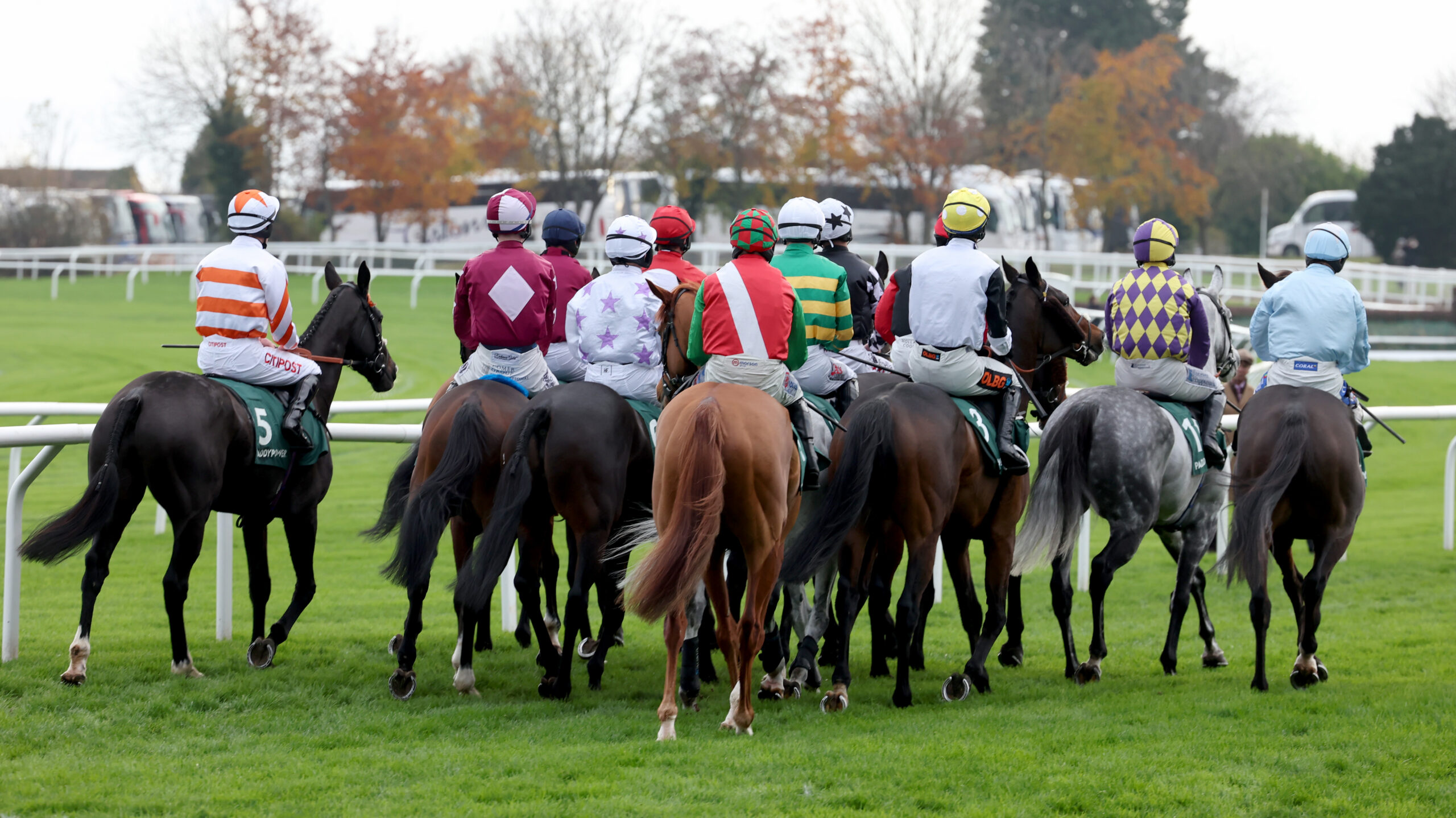
The BHA can today confirm that a rule change will enable Stewards to declare a horse a non-runner in Jumps races, or any other race that does not utilise starting stalls, if they determine that a horse has been denied a fair start.
The introduction of the new rule brings races started by tape or any other method into line with those beginning from starting stalls, where this power has been available to Stewards since 1 May 2024.
From Wednesday 1 October 2025, Stewards will be able to declare a horse a non-runner in a race started by any method other than starting stalls where they believe that horse has been denied a fair start through reasons outside of its control and seen its chances materially affected as a result.
As well as a horse being prevented from starting on equal terms due to the faulty action of a starting mechanism, Stewards will be able to declare a horse a non-runner if, for example, they rule that the horse in question was in a position at the actioning of the start that denied them the opportunity to start on equal terms, such as facing the wrong way or being significantly detached from the field.
Horses will NOT be declared a non-runner in instances where their own behaviour led to the horse not jumping away on terms, e.g. planting themselves or spinning round after the start has been effected.
Shaun Parker, BHA Head of Stewarding, said: “This rule change provides clarity for participants and bettors, harmonising the Rules in Britain across the two codes to provide greater consistency. It also ensures that all of our races, regardless of starting procedure, align with the International Federation of Horseracing Authorities model rule and the approach applied by other major jurisdictions.
“Ultimately, this is about fairness, both for the participants and the betting public and I’m very pleased we have been able to reach this point for this reason.
“While this is a Rule that has been required only around half a dozen times since its introduction in races beginning with starting stalls last year, it is clear that it has been well received and that there was a desire to see this further change come about.”
Examples
The following examples illustrate how the rule will be applied once it comes into force.
In the case of Maasai Mara at Sandown on 27 April 2024 (pictured below), the horse was planted and facing the wrong way prior to the release of the tape, unbeknownst to the Starter. As a result of still being faced the wrong way when the race is started, the horse lost all chance of obtaining a fair start.
In circumstances such as this, Stewards will have the power to declare a horse a non-runner under the new Rule.
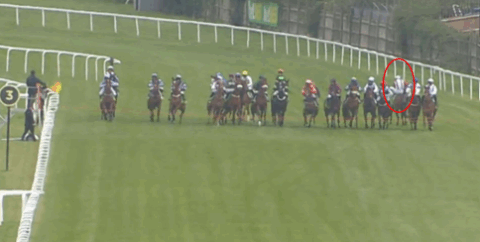
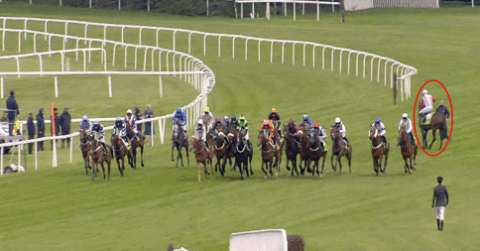
Another case that would result in a horse being called a non-runner under the new rule is that of Gardons La at Wincanton. Here, the horse can clearly be seen to be significantly detached from the remainder of the field and therefore denied the opportunity of a fair start.
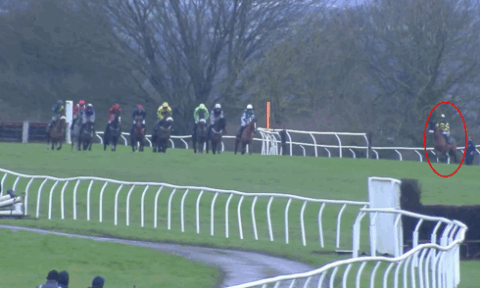
An example that would not change following the implementation of the new Rule is that of Maughreen at the Cheltenham Festival earlier this year (pictured below).
While the horse was proving awkward when lining up, she was in position to obtain a fair start when the tape was released. Maughreen then spins around after the start and the field leaves her adrift. A horse will not be declared a non-runner where it has had the opportunity to start on equal terms but does not through its own behaviour.
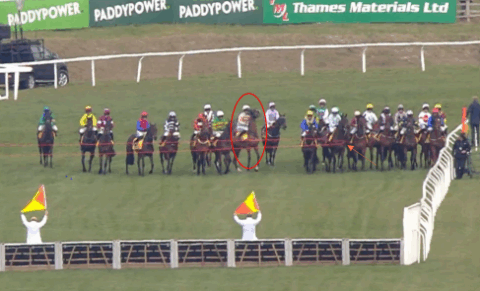
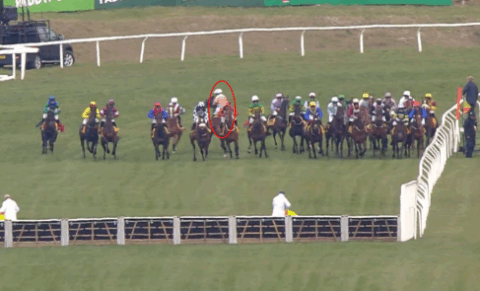
A horse will also not be declared a non-runner where it simply refuses to race, as Shishkin did at Ascot in November 2023.
It is important to stress that each case will be assessed on its own individual merits, considering the specific set have circumstances that have presented themselves in that given moment.
Any consideration by the Stewards will always precede the ‘weighed in’ signal, with participants, racegoers and the betting public alerted that an incident at the start of the race is being reviewed.
Note: a horse cannot be declared a non-runner under the provisions of Rule (H)6.1 if it wins the race.
The full change to Rule (H)6 is as follows:
Current wording of Rule (H)6
6. In a Race started from starting stalls, the Stewards may declare a horse a non-runner where:
6.1 a horse is denied a fair start, and its chances are materially affected, including but not limited to where:
6.1.1. a horse is prevented from starting on equal terms due to a faulty action of the starting stalls; or
6.1.2. that horse is riderless at the ‘Off’.
6.2 a horse has gained an unfair advantage at the start of the Race.
New wording of Rule (H)6 from 1 October 2025
6. The Stewards may declare a horse a non-runner where:
6.1 In a Race started from starting stalls, a horse is denied a fair start, and its chances are materially affected, including but not limited to where:
6.1.1 a horse is prevented from starting on equal terms due to a faulty action of the starting stalls; or
6.2 In a race started by any method other than starting stalls, a horse is denied a fair start, and its chances are materially affected, including but not limited to where:
6.2.1 a horse is prevented from starting on equal terms due to a faulty action of a starting mechanism; or
6.2.2 when the race is started, a horse is in such a position as to be denied the opportunity of starting on equal terms.
6.3 that horse is riderless at the ‘Off’.
6.4 that horse has gained an unfair advantage at the start of the Race.
Note: Examples where this might occur are extremely unlikely to include situations where a horse achieves an easy lead at the start, as this would usually be due to rider or horse behaviour. Instead, this might occur include, for example, where a horse approaches the tapes at a gallop while the balance of the field is at no more than a jig-jog, which should have triggered a false start but is not picked up by the starter.
